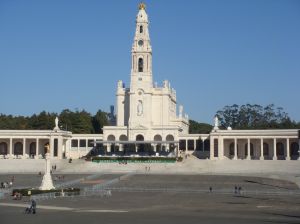I’ve been reading around in this great new book just out from Templeton Press, “New Threats to Freedom,” a compendium of essays from noted writers across the political spectrum who write about things they identify as a danger to liberty. I’ve just finished a provocative piece by Barry C. Lynn, in which he identifies “belief in false gods” as a threat to freedom. Lynn, incidentally, is a strong critic of globalization and its political effects. Here are excerpts from his “New Threats” essay:
[M]any Americans [have] been taught to believe in a metaphysical explanation of how our society functions. Rather than view ourselves as the masters of our own destinies, many of us see ourselves and our society as subject to the decrees of natural powers that have all but determined our future.
Globalization is by no means the only such force we perceive acting on or within our society. Americans today believe in a myriad of mechanistic processes directing us toward certain ends. For some, the dominant forces are technological. For others, biological. Many believe in forces produced by some dynamic in capitalism, or in free markets. Whatever the source, the practical result is the same: to evoke any of these awe-inspiring forces in a conversation about our political economy has much the same effect as to speak of “God’s will.”
And so, even when we believe our most vital political liberties are endangered, we increasingly do not view ourselves as free to do anything about it. Rather than sally out to protect our liberties, we sit, we wonder, we fidget, we fear.
Lynn goes on to remark critically on Americans’ misguided idea that the market is a neutral force, and an irresistable one. He derides Thomas Friedman as a “modern metaphysician” for his evangelization for globalism. He says people like Friedman and his followers may be more educated and cosmopolitan than religious fundamentalists, but their animating faith is just as theological in nature. More:
To understand globalization as a force that automatically weaves the nations of the world into a single economic system may make it harder to see the immense trading companies, like Wal-Mart and General Electric, which are the actual powers that nowadays determine the division of labor among nations. Such a believe may also make it harder to perceive how the ruling classes of mercantilist states like China increasingly use these same “American” companies to serve their particular interests, say by moving more of our machines and our technologies from our hands into theirs.
Similarly, to view the market as an all-embracing apparatus that determines, in a neutral fashion, the outcomes of our political economy may make it harder to spot the monopolists who use immensely powerful corporate governments to enclose our marketplaces, to seize the properties of our independent entrepreneurs, and to determine how much we pay for the basic stuff of our lives.
Lynn goes on to examine the case of China’s relationship with America, and how successive American administrations, both Democratic and Republican, have allowed their metaphysical belief in the almighty market to create a Friedmanesque global Utopia. He concludes:
When President Clinton announced his intention to turn the management of our nation’s relationship with Communist China over to globalization and technolgoy, America was an immensely rich and independent nation. Today, those who lift their eyes from the pages of our modern Panglosses will see that in less than a generation America has been made to depend directly on Chinese sources for most, in some cases all, of our most vital drugs, food additives, electronics, machines, and cloths, as well as the cash we borrow to pay for it all.
Ideas have consequences. Lynn’s point is that to believe that globalization is inevitable because that’s the way the world works is to surrender your liberty of action. The book is called “New Threats to Freedom,” edited by Adam Bellow. By the way, if you’re in Philadelphia on Monday evening (May 17) and want to attend a free live broadcast of the Hugh Hewitt Show at the National Liberty Museum, in which the radio host will interview Bellow and some of the book’s contributors, here’s information about the event.

